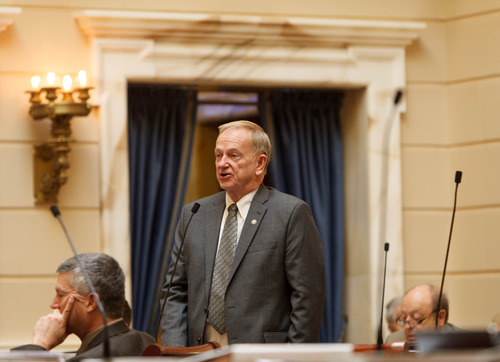This is an archived article that was published on sltrib.com in 2013, and information in the article may be outdated. It is provided only for personal research purposes and may not be reprinted.
Five weeks after Utah's governor squelched an attempt to let residents carry concealed guns without a permit, verbal volleys are flying between the Layton police chief and a state lawmaker, who says the chief's pro-veto opinion piece repeats "the same damn lies" about how "the streets are going to run red with blood."
Rep. Curt Oda, R-Clearfield, a longtime gun-rights crusader, is blasting Layton Chief Terry Keefe for last week's op-ed in the Deseret News that dismissed HB76 as "a dramatic and unnecessary change."
Now Oda, along with HB76 Senate sponsor Allen Christensen, R-North Ogden, are vowing both a retort to Keefe and the resurrection in January of the contentious constitutional-carry bill.
"The chief lied through his teeth," Oda said in an interview. "He's our friend, but I've lost a lot of respect for him. He keeps going back to the same damn lies. I'm beside myself."
Oda takes issue with language penned by Keefe that says under the vetoed legislation any person over age 21 "regardless of any history of these convictions or behaviors ... may carry a loaded firearm openly or concealed."
"Loaded and background are straight-out lies," said Oda, whose House District 14 includes part of Layton. "It was incredible. Every time we come up with some kind of a gun bill, the police chiefs say the streets are going to run red with blood. Everything they say — the prognostications never come true."
Keefe says he is surprised by the attack, "especially since I haven't been contacted" by either lawmaker.
"The op-ed was simply a thank you to the governor for vetoing it," he said. "I don't think we praised the contents of the bill."
References to a loaded firearm, the chief explained, reflect existing state law, which permits a firearm to be loaded but not fully. Current statute allows adults to open carry without a permit so long as there is no round in the chamber and the gun remains at least two "mechanical actions" from firing.
"I know that Representative Oda is very passionate about gun rights, as are a lot of people, as am I," the chief said. "I do support the Second Amendment as much as anyone else. Some of the criticism I am surprised at. But again, everyone is entitled to their own opinion.
"They can introduce whatever bill they want ... and we'll see what happens."
Until March, Keefe served as president of the Utah Chiefs of Police Association, which opposed HB76. Keefe writes that the constitutional-carry measure would be "difficult and dangerous" to enforce, adding that its enactment "abridges the ability of public safety officers from responding to the concerns of our residents and businesses."
For his part, Christensen says the op-ed was "full of mistakes," but he predicts the constitutional carry law will have the necessary votes to overcome a potential veto next year.
"I expect we should be able to get at least 20," he said, referring to the number of votes required in the 29-member Senate to override a veto. And he noted the expense of an override session Republicans cited this year — rather than objecting to the bill's substance — was "the excuse they used."
As part of last month's veto, Gov. Gary Herbert sent legislative leaders a letter saying Utah's permitting system has become a "national model."
"As a state, we must exercise extreme care that we not impose undue burdens on the right to bear arms," Herbert wrote, "but I have yet to receive any credible evidence that Utah's current permit process constitutes a hardship."



